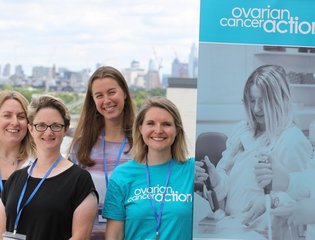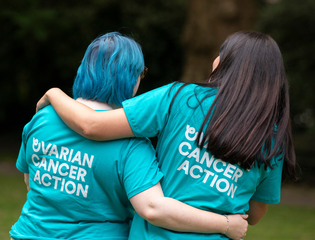IMPROVE UK, Birmingham and Cambridge
The Demonstration of Improvement for Molecular Ovarian Cancer Testing (DEMO)
Lead by Dr Elaine Leung & Dr Gabriel Funingana.
The background
Genetic testing helps to identify the best personalised treatment options for each woman, helping more women to survive ovarian cancer. The pilot wants to improve uptake and success rates of genetic testing in women with ovarian cancer, especially in Black, Asian and Minority Ethnic communities that have the lowest rates of testing.
We will also tackle the significant variations in the quality of tumour samples taken around the country to improve the success rate of molecular testing of their cancers to guide treatment.
“A diagnosis turns your world upside down and takes control of your life. Having a genetic test to shape your own personal treatment plan removes that helplessness and involves you as part of the team developing your care. I feel fortunate being able to benefit from such ground-breaking developments in ovarian cancer treatment. What really hits home is that even ten years ago, the option of a personalised approach to treatment just wasn’t on the table. So my advice: if you’re offered the chance of personal testing, grab it with both hands!’
The plan
The lack of informed decision-making resources for women whose first language is not English contribute to the lower genetic testing uptake rate. The team will work with BAME patient groups to co-produce audio-visual and written information on genetic testing in multiple languages, as well as exploring why some groups of women are more likely to decline genetic testing.
The project will establish a cross-regional audit pathway for ovarian cancer genetic testing. In addition, we aim to produce a nationwide consensus guideline on best practices for taking patient biopsies, to ensure tumour genetic testing can be carried out and patients can benefit from personalised medicine.
The collaborating team- The Pan-Birmingham Gynaecological Cancer and the University of Cambridge
The Pan-Birmingham Gynaecological Cancer Centre, based at the Sandwell and West Birmingham NHS Trust, and the Anglia Cancer Network (AngCN) deliver cancer care to almost 5 million people in West Midland and Anglia. The collaborating team includes 2 regional centres and 10 gynaecological cancer units.
This project also builds on the team’s previous experience with the genetic testing studies, looking at BRCA testing in women with a new diagnosis of ovarian cancer before it became mainstream practice.
Further information about this project:
Please contact: Dr Elaine Leung (elaine.leung@nhs.net) & Dr Gabriel Funingana (igf21@medschl.cam.ac.uk)

